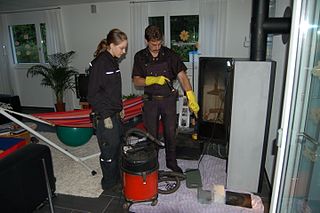
Vocational education is education that prepares people to work as a technician or to take up employment in a skilled craft or trade as a tradesperson or artisan. Vocational education is sometimes referred to as career and technical education.

Apprenticeship is a system for training a new generation of practitioners of a trade or profession with on-the-job training and often some accompanying study. Apprenticeships can also enable practitioners to gain a license to practice in a regulated occupation. Most of their training is done while working for an employer who helps the apprentices learn their trade or profession, in exchange for their continued labor for an agreed period after they have achieved measurable competencies.

Carpentry is a skilled trade and a craft in which the primary work performed is the cutting, shaping and installation of building materials during the construction of buildings, ships, timber bridges, concrete formwork, etc. Carpenters traditionally worked with natural wood and did rougher work such as framing, but today many other materials are also used and sometimes the finer trades of cabinetmaking and furniture building are considered carpentry. In the United States, 98.5% of carpenters are male, and it was the fourth most male-dominated occupation in the country in 1999. In 2006 in the United States, there were about 1.5 million carpentry positions. Carpenters are usually the first tradesmen on a job and the last to leave. Carpenters normally framed post-and-beam buildings until the end of the 19th century; now this old-fashioned carpentry is called timber framing. Carpenters learn this trade by being employed through an apprenticeship training—normally 4 years—and qualify by successfully completing that country's competence test in places such as the United Kingdom, the United States, Canada, Switzerland, Australia and South Africa. It is also common that the skill can be learned by gaining work experience other than a formal training program, which may be the case in many places.
A journeyman is a worker, skilled in a given building trade or craft, who has successfully completed an official apprenticeship qualification. Journeymen are considered competent and authorized to work in that field as a fully qualified employee. They earn their license by education, supervised experience and examination. Although journeymen have completed a trade certificate and are allowed to work as employees, they may not yet work as self-employed master craftsmen.

Legal education is the education of individuals in the principles, practices, and theory of law. It may be undertaken for several reasons, including to provide the knowledge and skills necessary for admission to legal practice in a particular jurisdiction, to provide a greater breadth of knowledge to those working in other professions such as politics or business, to provide current lawyers with advanced training or greater specialisation, or to update lawyers on recent developments in the law.

A tradesman or tradesperson is a skilled worker that specializes in a particular trade. Tradesmen usually have work experience, on-the-job training, and often formal vocational education in contrast to an apprentice, who is learning the trade.
Regulation and licensure in engineering is established by various jurisdictions of the world to encourage public welfare, safety, well-being and other interests of the general public and to define the licensure process through which an engineer becomes authorized to practice engineering and/or provide engineering professional services to the public.

Education in Germany is primarily the responsibility of individual German states, with the federal government playing a minor role. Optional Kindergarten education is provided for all children between one and six years old, after which school attendance is compulsory. Overall, Germany is one of the best performing OECD countries in reading literacy, mathematics and sciences with the average student scoring 515 in the PISA Assessment Test, well above the OECD average of 497 points. Germany has a less competitive system, leading to low rates of bullying and students having a weak fear of failure but a high level of self-confidence and general happiness compared to other OECD countries like South Korea. Additionally, Germany has one of the largest percentage of top performers in reading among socio-economically advantaged students, ranking 3rd out of 76 OECD countries. This leads to Germany having one of the highest-educated labour forces among OECD countries.

Doctor of Medicine is a medical degree, the meaning of which varies between different jurisdictions. In the United States, and some other countries, the M.D. denotes a professional graduate degree. This generally arose because many in 18th-century medical professions trained in Scotland, which used the M.D. degree nomenclature. In England, however, Bachelor of Medicine, Bachelor of Surgery was used and eventually in the 19th century became the standard in Scotland too. Thus, in the United Kingdom, Ireland and other countries, the M.D. is a research doctorate, higher doctorate, honorary doctorate or applied clinical degree restricted to those who already hold a professional degree(Bachelor's/Master's /Doctoral) in medicine; in those countries, the equivalent professional to the North American and some others use of M.D. is still typically titled Bachelor of Medicine, Bachelor of Surgery (M.B.B.S.).

An engineering technologist is a professional trained in certain aspects of development and implementation of a respective area of technology. Engineering technology education is even more applied and less theoretical than engineering education, though in a broad sense both have a focus on practical application. Engineering technologists often assist engineers but after years of experience, they can also become engineers. Like engineers, areas where engineering technologists can work include product design, fabrication and testing. Also as with engineers, engineering technologists sometimes rise to senior management positions in industry or become entrepreneurs.

A master craftsman or master tradesman was a member of a guild.

A vocational school is a type of educational institution, which, depending on the country, may refer to either secondary or post-secondary education designed to provide vocational education or technical skills required to complete the tasks of a particular and specific job. In the case of secondary education, these schools differ from academic high schools which usually prepare students who aim to pursue tertiary education, rather than enter directly into the workforce. With regard to post-secondary education, vocational schools are traditionally distinguished from four-year colleges by their focus on job-specific training to students who are typically bound for one of the skilled trades, rather than providing academic training for students pursuing careers in a professional discipline. While many schools have largely adhered to this convention, the purely vocational focus of other trade schools began to shift in the 1990s "toward a broader preparation that develops the academic" as well as technical skills of their students.

Education in South Korea is provided by both public schools and private schools. Both types of schools receive funding from the government, although the amount that the private schools receive is less than the amount of the state schools.

A law school is an institution specializing in legal education, usually involved as part of a process for becoming a lawyer within a given jurisdiction.
A dual education system combines apprenticeships in a company and vocational education at a vocational school in one course. This system is practiced in several countries, notably Germany, Austria, Switzerland and in the German-speaking Community of Belgium, but also for some years now in South Korea.
In the Federal Republic of Germany, craft trades are governed by the Crafts and Trade Code. This administrative law covers the commercial practice of handicraft; vocational education and training in the craft sector; and the self-administration of this economic sector. This law is a special trade regulation, and its provisions on vocational training form a special law within the Vocational Training Act.
Instrument mechanics in engineering are tradesmen who specialize in installing, troubleshooting, and repairing instrumentation, automation and control systems. The term "Instrument Mechanic" came about because it was a combination of light mechanical and specialised instrumentation skills. The term is still is used in certain industries; predominantly in industrial process control.
A Fachwirt is a professional certification in Germany allocated to level 6 of the European Qualifications Framework, where it is translated as business management specialist.
Apprenticeships have a long tradition in the United Kingdom, dating back to around the 12th century. They flourished in the 14th century and were expanded during the industrial revolution. In modern times, apprenticeships were formalised in 1964 by act of parliament and they continue to be in widespread use to this day.

Apprenticeships are part of Germany's dual education system, and as such form an integral part of many people's working life. Finding employment without having completed an apprenticeship is almost impossible. For some particular technical university professions, such as food technology, a completed apprenticeship is often recommended; for some, such as marine engineering it may even be mandatory.












